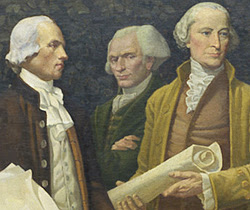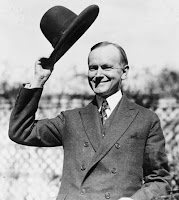"The reign of party spirit in the United States began with the adoption of [the Constitution] by the Convention. Between this date and that of its ratification by the States the Federal and Anti-Federal parties struggled for supremacy, the former being in favor of a strong central government, the latter favoring the practical independence of the States. The ratification of the Constitution by the States ended this contest. The prominent Anti-Federalists announced their intention of supporting the Constitution, and for several years there was practically but one party in the country. George Washington was the first President elected, the electoral vote in his favor being unanimous. John Adams was chosen for Vice-President. Until about 1824-28, electors were generally chosen by the State legislatures, not by the direct vote of the people, as since that period. The two persons receiving the highest electoral vote became respectively President and Vice-President.
Opposition to the Federal party began in 1790, when Hamilton broached a project for the assumption of State debts by the central government. It grew stronger in 1791, when he proposed to establish a national bank. Jefferson, who had been the first Secretary of State, was now found at the head of a party in open opposition to the administration. This party, though adopting the name of Republicans, advocated the principles of the older Anti-Federalists, claiming that there was a scheme to subvert the State governments and establish a strong central government, and denouncing the Hamilton party as monarchists. Democratic clubs soon after arose, instigated by, and imitating many of the follies of, the Jacobin revolutionists of France. They had the one good effect of introducing political discussion among the masses of the people, and in a few years the Democrats coalesced with the Republicans as a single national party. The Federalists, however, continued in the majority, and in 1792 Washington and Adams were again elected President and Vice-President.
During this second term the power of the Republican party rapidly increased. The acts of the administration were fiercely attacked, and when, at the approach of a new election, Washington announced his intention to retire, a hot political contest arose, which nearly resulted in a Republican victory. Of the electoral votes Adams received seventy-one, and Jefferson sixty-eight, the latter receiving all but two of the Southern votes. The new administration was therefore organized with Adams for President and Jefferson for Vice-President.
The financial condition of the country had now greatly improved. A sound credit was established, funds were provided for the payment of the national debt, and treaties were concluded with the Indians and with several of the European powers, while a very rapid increase in population and in agricultural and commercial wealth had taken place. During the summer of 1800 the seat of government was removed from Philadelphia to Washington, as at that time the centre of the country. The Republican party continued to develop in strength, mainly on account of the passage of laws which tended to strengthen the central government, and which were unfavorably received by the people. The "Alien Law," which empowered the President to order from the country any foreigner whose presence he deemed dangerous to the public safety, and the "Sedition Law," which visited with fine and imprisonment "any false, scandalous, or malicious writing against the government of the United States, or either House of Congress, or the President," were deemed tyrannical measures; while the effort to pass an act establishing a standing army added to the unpopularity of the Federalists. In the election of 1800, therefore, the Republicans were victorious. Jefferson became President, and Aaron Burr, who had prominent control of the Democratic party, was made Vice-President. Jefferson and Burr, indeed, received an equal number of votes, and Congress had to decide between them. With this election the power of the Federal party ceased, and for many years thereafter the "State Rights" Democratic-Republican party continued in the supremacy. The effort to strengthen the central government unduly at the expense of the power of the States had failed, and the Federalists, as a distinct party, gradually vanished from existence."
Hubert H. Bankcroft, ed., The Great Republic By the Master Historians, Vol. II (c. 1900)
Opposition to the Federal party began in 1790, when Hamilton broached a project for the assumption of State debts by the central government. It grew stronger in 1791, when he proposed to establish a national bank. Jefferson, who had been the first Secretary of State, was now found at the head of a party in open opposition to the administration. This party, though adopting the name of Republicans, advocated the principles of the older Anti-Federalists, claiming that there was a scheme to subvert the State governments and establish a strong central government, and denouncing the Hamilton party as monarchists. Democratic clubs soon after arose, instigated by, and imitating many of the follies of, the Jacobin revolutionists of France. They had the one good effect of introducing political discussion among the masses of the people, and in a few years the Democrats coalesced with the Republicans as a single national party. The Federalists, however, continued in the majority, and in 1792 Washington and Adams were again elected President and Vice-President.
During this second term the power of the Republican party rapidly increased. The acts of the administration were fiercely attacked, and when, at the approach of a new election, Washington announced his intention to retire, a hot political contest arose, which nearly resulted in a Republican victory. Of the electoral votes Adams received seventy-one, and Jefferson sixty-eight, the latter receiving all but two of the Southern votes. The new administration was therefore organized with Adams for President and Jefferson for Vice-President.
The financial condition of the country had now greatly improved. A sound credit was established, funds were provided for the payment of the national debt, and treaties were concluded with the Indians and with several of the European powers, while a very rapid increase in population and in agricultural and commercial wealth had taken place. During the summer of 1800 the seat of government was removed from Philadelphia to Washington, as at that time the centre of the country. The Republican party continued to develop in strength, mainly on account of the passage of laws which tended to strengthen the central government, and which were unfavorably received by the people. The "Alien Law," which empowered the President to order from the country any foreigner whose presence he deemed dangerous to the public safety, and the "Sedition Law," which visited with fine and imprisonment "any false, scandalous, or malicious writing against the government of the United States, or either House of Congress, or the President," were deemed tyrannical measures; while the effort to pass an act establishing a standing army added to the unpopularity of the Federalists. In the election of 1800, therefore, the Republicans were victorious. Jefferson became President, and Aaron Burr, who had prominent control of the Democratic party, was made Vice-President. Jefferson and Burr, indeed, received an equal number of votes, and Congress had to decide between them. With this election the power of the Federal party ceased, and for many years thereafter the "State Rights" Democratic-Republican party continued in the supremacy. The effort to strengthen the central government unduly at the expense of the power of the States had failed, and the Federalists, as a distinct party, gradually vanished from existence."
Hubert H. Bankcroft, ed., The Great Republic By the Master Historians, Vol. II (c. 1900)







